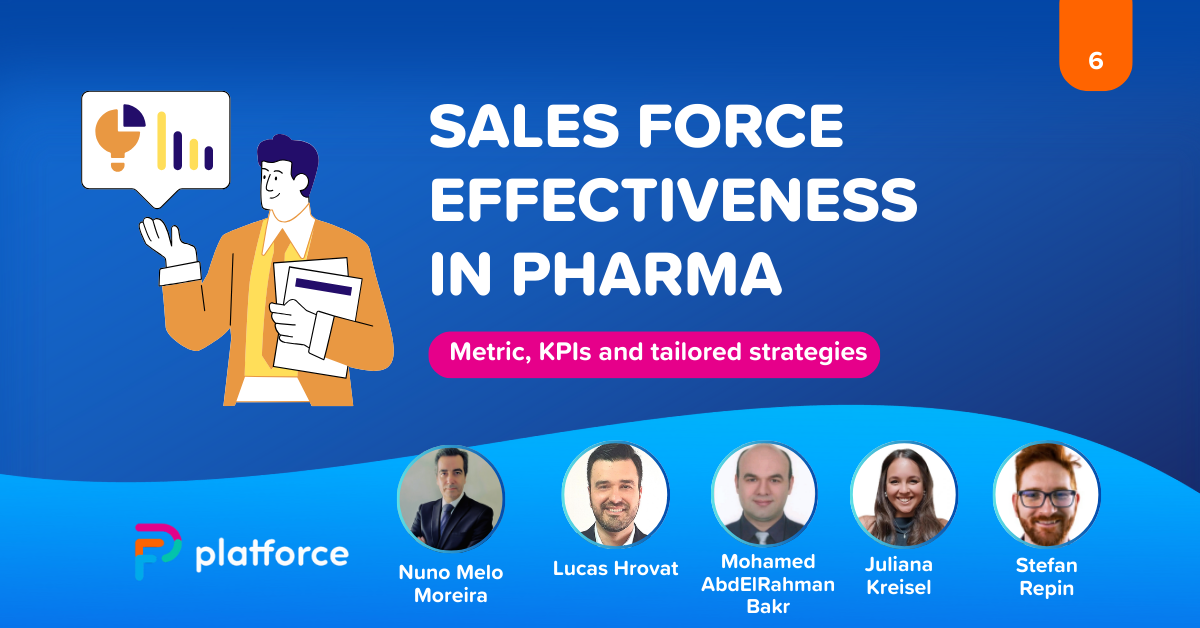Pharma Insights continued its exploration into the crucial aspects of Sales Force Effectiveness (SFE) in the pharmaceutical and healthcare industries during its sixth episode. Hosted by Platforce’s Head of Marketing, Stefan Repin, and Events Manager, Juliana Maria Kreisel, this session provided a deep dive into the metrics, KPIs, and strategies vital for enhancing sales force performance.
Understanding Key Components of Salesforce Effectiveness
The conversation highlighted the importance of adapting sales strategies to local contexts. In different markets, the approach to sales force effectiveness (SFE) can vary significantly, necessitating a deep understanding of local regulations, healthcare practices, and patient needs to tailor strategies accordingly.
The episode began with a comprehensive discussion of the foundational components that drive SFE across various markets. The panel featured speakers:
- Mohamed AbdElRahman Bakr, Sales Force Effectiveness Manager, LIPTIS Egypt,
- Lucas Hrovat, Sr. Manager of Commercial Execution for LATAM & Canada at Abbott
- Nuno Melo Moreira, a seasoned consultant in Pharmaceuticals and Healthcare, shared their expertise on how tailored strategies can address varied customer needs effectively.
Watch the full webinar recording here:
Metrics and KPIs for Measuring Effectiveness
The webinar focused on measuring the effectiveness of sales strategies. Mohamed AbdElRahman Bakr discussed the various KPIs used to gauge success, emphasizing that a robust set of metrics is crucial not only for reaching targets but also for fostering meaningful engagements with healthcare providers. The metrics include coverage and frequency of contact, sales performance, and customer satisfaction levels.
The Role of Technology in Enhancing SFE
The panel also examined the transformative role of modern technologies like AI and CRM systems in refining sales strategies. By leveraging AI and CRM tools, sales teams can customize their approaches based on real-time data, thus enhancing both efficiency and responsiveness to the needs of healthcare providers. These technologies enable a more proactive stance, allowing sales representatives to anticipate and meet the needs of their clients more effectively.
Virtual Medical Reps and Their Growing Importance
The rise of virtual medical representatives was another key topic, especially given the context of the COVID-19 pandemic. The shift to digital platforms has become imperative, prompting sales teams to quickly adapt and utilize virtual tools to maintain and build relationships with healthcare professionals. This transition has underscored the need for agility and adaptability in sales strategies.
Sales Force Contributions to Growth
Towards the end of the webinar, the discussion shifted to the significant contributions of effectively managed sales forces to the overall growth and expansion of pharmaceutical companies. Nuno Melo Moreira emphasized the importance of aligning sales strategies with broader business objectives to ensure that every team member is informed and aligned with the company’s growth targets. This alignment helps in creating a cohesive effort towards achieving business goals.
Final Thoughts
This episode of the Pharma Insights Talk Show provided valuable insights into optimizing sales force effectiveness through strategic planning, precise metrics, and the integration of advanced technologies. As the pharmaceutical industry continues to evolve, such discussions are crucial for staying competitive in a dynamic market. The integration of technology, adaptation to local market needs, and the rise of virtual engagement are key trends that will shape the future of sales force effectiveness in the pharmaceutical industry.
About Platforce
Platforce’s cloud-based CRM and CLM makes full sales cycle management for Pharmaceutical and Life Science companies completely painless. Book a demo of Platforce with our team to learn more!








